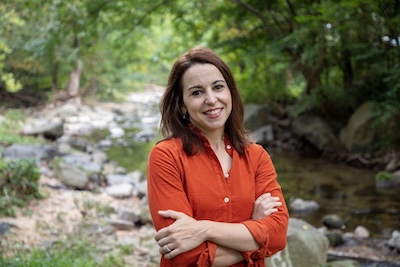
Sara R. Burnett
Poetry
Sara R. Burnett is the author of Seed Celestial (2022), winner of the 2021 Autumn House Press Poetry Prize. Her poetry has appeared or is forthcoming in Barrow Street, Copper Nickel, Matter, Poet Lore, RHINO, and elsewhere. She has received fellowships from the Bread Loaf Writers’ Conference to support her writing and was a finalist for the 2019 Enoch Pratt Library Poetry Prize. She holds an MFA from the University of Maryland–College Park and an MA in English Literature from the University of Vermont. She lives in Maryland with her spouse and two young children.
My Children Are Falling in Love With the World
Where Mondays are Saturdays and Fridays
are any day of the week where they eat pancakes.
Just this morning, they stood statuesque on the couch
in their footed pajamas watching the snow.
Later, my son ate a snowball like it was a juicy July peach
& my daughter rubbed angel after angel after angel
in mud-smeared snow as she smiled to the sky. A shared
cream cheese sandwich on marbled rye, plus gummy bears.
How satisfying the mail, even junk mail, that arrives
after it sails through the door slot with a clank.
The way they fully extend their arms to wave at the garbage truck
& the men alighting on & off it as if watching a parade.
When reading a book, they plop down into my lap
like stones thrown in a shallow pool—they are in it.
The big fat clock swings its pendulum like a dog
chasing its tail & it never sounds alarmed.
There are not enough sticks or pillows or potato bugs
or bubbles or sprinkles or puddles
& the cardinal who visits our feeder in the dogwood tree
every day is ours, I’ve pinky-promised him.
My children are falling in love with the world
& stuffing their coat pockets with it:
bits of paper, string, & coins as if preparing for a long
voyage away from it, which maybe they are,
their odyssey, our Ithaca, where the snow falls again
& they lift up their chins & tilt back their heads
to catch all that’s melting around them whole.
“
This poem leans into joy. I wrote other versions of this poem where I offered details of our climate changing (icebergs melting, sea level rise and so on), but it dampened the joyful energy of this poem at the beginning. This is a good example of getting out of one’s own way and letting the poem speak. This poem doesn’t ignore climate change, but it keeps it at a distance in the same way I try to keep it at a distance for my very young kids, who were probably 3 and 6 at the time.
”

